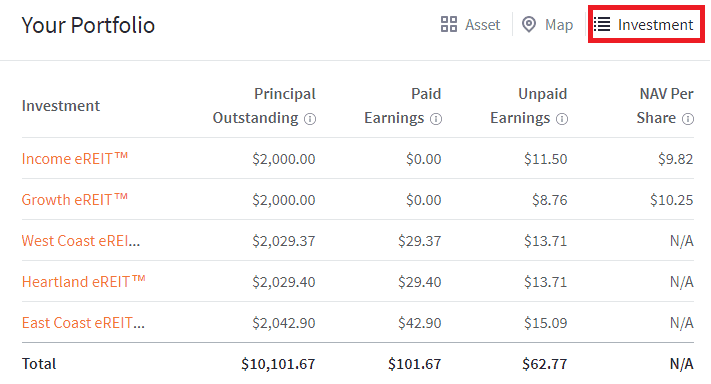
It is easy to diversify your portfolio by investing in real estate funds. It can also be costly and risky. These are just a few of the important things to remember before you start investing in realty funds. The fund manager, industry concentration, geographic concentration, and fund structure all play a role in the performance of the fund. These principles can be used by individual investors to invest in real estate funds. For investors who are unsure about the investment strategy, a fund manager can provide you with guidance.
Investing in real estate funds is easy
If overhead costs for real estate are low, it can be a conservative way to invest. The risk-reward ratio of low-leverage loans to urban trophy assets is comparable to that of a high-credit bond. However, returns on highly-speculative investment projects are comparable to those from venture capital funds and small-cap Equity investments. Real estate investments are a great way increase your wealth. As long as your money is managed prudently and you don't lose any money, it can be a great investment.
Real estate funds offer many benefits, including the possibility of immediate income and long-term appreciation. Real estate funds do not require you to manage, or even own, properties like traditional investment. Instead, you can purchase shares in a fund to let professionals manage your investments. You buy and sell shares like you would in any other mutual fund. Direct real property investing is a great option for investors who want to diversify their portfolios. It offers predictable returns and tax advantages.

It offers diversification
A fund that invests primarily in real estate usually offers higher yields than other investment options. Its high correlation coefficient is useful for diversification. One should remember, however, that correlations between past markets and future ones are not always indicative or reliable indicators of future performance. Diversification with real-estate is important. It provides protection from market fluctuations and the inherent danger of realty. But, real estate isn't a foolproof strategy. The right manager can mitigate certain risks and provide diversification.
A real estate investment fund can be more diversifiable and less expensive than an REIT. Real estate mutual funds can also offer professional portfolio management services and research. They provide capital appreciation and dividend income, which are key indicators of the growth of an investment portfolio. Unlike individual real estate investments, real estate funds must distribute 90% of their taxable income. Real estate funds also offer inflation-proofing benefits.
It's expensive
There are many reasons to invest in real estate funds. First, realty is a tangible investment. Real estate can be touched or stood on, no matter what type of property it is. Real estate is an asset that will not go anywhere and has a high return rate. Real estate also has tax advantages that can increase wealth. If you are interested in investing in real property, you must have the time, experience, as well as the funding necessary to make a profitable investment.
It is a good place to start investing real estate with a self directed IRA. The potential for diversification is huge, even though real estate only accounts for three percent of S&P 500. Publicly traded REITs have the best chance to outperform all other stock types. You can also invest in privately held funds if you prefer a more hands off approach. However, it is important to research the sponsor before you make an investment.

It's risky
Although it is risky to invest in real estate funds, there are some benefits. First, it gives investors a tangible asset. Real estate can be touched, or even stood on, unlike stocks. It provides security and comfort to investors. Real estate can also be sold to make a profit. It can also serve as collateral for loans.
Real estate securities can pose risks, including illiquidity and general market conditions. Long holding periods are possible for real estate securities, which could mean that you lose all of your investment. Real estate securities can also have long holding periods, which could mean that you may lose all of your money. Past performance is not a guarantee of future results. Potential cash flow, returns, appreciation, and cash flow are not guaranteed. For example, investors might not realize that their investment will yield a profit if the tenant doesn't pay the rent.
FAQ
How does inflation affect the stock market
Inflation has an impact on the stock market as investors have to spend less dollars each year in order to purchase goods and services. As prices rise, stocks fall. You should buy shares whenever they are cheap.
How do I invest on the stock market
Brokers allow you to buy or sell securities. A broker can sell or buy securities for you. Trades of securities are subject to brokerage commissions.
Brokers usually charge higher fees than banks. Banks offer better rates than brokers because they don’t make any money from selling securities.
You must open an account at a bank or broker if you wish to invest in stocks.
A broker will inform you of the cost to purchase or sell securities. This fee is based upon the size of each transaction.
Ask your broker about:
-
To trade, you must first deposit a minimum amount
-
If you close your position prior to expiration, are there additional charges?
-
What happens if your loss exceeds $5,000 in one day?
-
How many days can you maintain positions without paying taxes
-
How much you are allowed to borrow against your portfolio
-
Whether you are able to transfer funds between accounts
-
How long it takes for transactions to be settled
-
The best way to sell or buy securities
-
How to Avoid fraud
-
how to get help if you need it
-
If you are able to stop trading at any moment
-
What trades must you report to the government
-
Reports that you must file with the SEC
-
Whether you need to keep records of transactions
-
Whether you are required by the SEC to register
-
What is registration?
-
What does it mean for me?
-
Who is required to be registered
-
What are the requirements to register?
What are some advantages of owning stocks?
Stocks are less volatile than bonds. The value of shares that are bankrupted will plummet dramatically.
But, shares will increase if the company grows.
Companies usually issue new shares to raise capital. This allows investors to purchase additional shares in the company.
To borrow money, companies use debt financing. This gives them access to cheap credit, which enables them to grow faster.
When a company has a good product, then people tend to buy it. As demand increases, so does the price of the stock.
As long as the company continues producing products that people love, the stock price should not fall.
What's the difference among marketable and unmarketable securities, exactly?
Non-marketable securities are less liquid, have lower trading volumes and incur higher transaction costs. Marketable securities can be traded on exchanges. They have more liquidity and trade volume. Marketable securities also have better price discovery because they can trade at any time. But, this is not the only exception. For example, some mutual funds are only open to institutional investors and therefore do not trade on public markets.
Marketable securities are more risky than non-marketable securities. They generally have lower yields, and require greater initial capital deposits. Marketable securities are generally safer and easier to deal with than non-marketable ones.
A large corporation may have a better chance of repaying a bond than one issued to a small company. This is because the former may have a strong balance sheet, while the latter might not.
Because they are able to earn greater portfolio returns, investment firms prefer to hold marketable security.
How are Share Prices Set?
Investors decide the share price. They are looking to return their investment. They want to make profits from the company. They purchase shares at a specific price. The investor will make more profit if shares go up. Investors lose money if the share price drops.
An investor's main goal is to make the most money possible. This is why they invest. It helps them to earn lots of money.
How can I select a reliable investment company?
You should look for one that offers competitive fees, high-quality management, and a diversified portfolio. The type of security that is held in your account usually determines the fee. Some companies charge no fees for holding cash and others charge a flat fee per year regardless of the amount you deposit. Some companies charge a percentage from your total assets.
It's also worth checking out their performance record. You might not choose a company with a poor track-record. Avoid companies with low net assets value (NAV), or very volatile NAVs.
Finally, it is important to review their investment philosophy. In order to get higher returns, an investment company must be willing to take more risks. They may not be able meet your expectations if they refuse to take risks.
What is the role of the Securities and Exchange Commission?
The SEC regulates securities exchanges, broker-dealers, investment companies, and other entities involved in the distribution of securities. It also enforces federal securities laws.
Statistics
- Individuals with very limited financial experience are either terrified by horror stories of average investors losing 50% of their portfolio value or are beguiled by "hot tips" that bear the promise of huge rewards but seldom pay off. (investopedia.com)
- For instance, an individual or entity that owns 100,000 shares of a company with one million outstanding shares would have a 10% ownership stake. (investopedia.com)
- The S&P 500 has grown about 10.5% per year since its establishment in the 1920s. (investopedia.com)
- US resident who opens a new IBKR Pro individual or joint account receives a 0.25% rate reduction on margin loans. (nerdwallet.com)
External Links
How To
How can I invest my money in bonds?
An investment fund, also known as a bond, is required to be purchased. You will be paid back at regular intervals despite low interest rates. These interest rates are low, but you can make money with them over time.
There are many ways you can invest in bonds.
-
Directly buy individual bonds
-
Buy shares of a bond funds
-
Investing through an investment bank or broker
-
Investing through a financial institution
-
Investing through a Pension Plan
-
Invest directly through a broker.
-
Investing in a mutual-fund.
-
Investing with a unit trust
-
Investing with a life insurance policy
-
Investing with a private equity firm
-
Investing with an index-linked mutual fund
-
Investing via a hedge fund